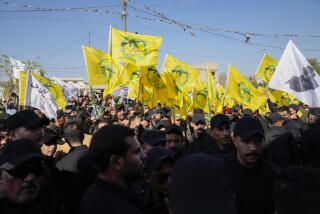Iran May Yet Savor Sweet Revenge in Iraq : Uprising: The Gulf War has unleashed forces that may bring power to Iraqi Shiites and profound change to the area.
- Share via
It is the ultimate irony of the Gulf War that America’s crushing of Saddam Hussein has now liberated the forces of the Shiite movement in Iraq. Iran has grounds to hope that its long-sought goal of bringing a Shia Muslim government to power in Iraq may at last be possible. If events were to go that way, the implications for the region would be profound.
The Shiites of Iraq, about 55%-60% of the population in the south, have been largely excluded from any kind of voice in government since Saddam Hussein came to power. They have maintained intimate ties with Iran for centuries, sharing a common intellectual and religious culture. The Shiite clergy of Iraq played a significant role in Iranian clerical politics, and vice versa. Today, the Shiites want to break the yoke of the harsh secular Baath regime, and to have a voice proportional to their numbers in the future of Iraq.
This development is yet another unexpected windfall from the war for Iran. Tehran already possesses ready-made external leverage in Iraqi politics: a fifth column of 350,000 Iraqi Shiite exiles who took refuge in Iran during the Iran-Iraq War, many of whom have been organized into the Supreme Assembly of the Islamic Revolution of Iraq (SAIRI), under the leadership of Hojatullah Mohammed Bakr Hakim. The late Ayatollah Ruhollah Khomeini envisioned SAIRI as both the spear-head of Shiite political activism and the “Iraqi government in exile,” which would replace Hussein if he fell to Iranian forces in the Iran-Iraq War.
Today we read accounts of major rioting all through the Shiite cities of the south against Saddam Hussein. SAIRI is not alone, for the pro-Shiite Dawaa Party also is now active in Iraq, as well as a Shiite guerrilla organization, Amal.
Could the Shiites come to power in Baghdad? This would require not only the destruction of Saddam Hussein, but also of the entire Baath Party structure in Iraq. Nonetheless, even if the Baath Party disintegrates in the face of widespread national rebellion, the Shiites still lack the immediate wherewithal to come to power alone. The Sunnis hold military power and control the security organizations. The (Sunni) Republican Guards reportedly are putting down the Shiite rebellion, which will only redouble the legacy of Shiite pain and rage against Baghdad. The caldron is sure to boil over, sooner or later. It may be only a matter of time before the Shiites take power in the southern cities; they could then be in a position of strength to negotiate power-sharing with a weak central government. They also seek the support of the Iraqi Kurds. That combination would leave a Sunni Arab population of no more than 25% to oppose them.
Iran is surely supporting the Shiite uprising in Iraq--it has long been awaiting this day. But it did not take Iran to spark this revolt--the grievances were there aplenty. Tehran will send back many key Iraqi Shiite political figures and thousands of activists in exile in Iran, as well as weapons. But as ambitious as Tehran is to bring the Shiites to power in Iraq, it almost surely will not invade Iraq. Iran claims to oppose the dissection of Iraq, and the Gulf War has spoken eloquently about the non-acceptability of territorial aggrandizement.
Should the Shiites come to power in Iraq, prospects for cooperation between Iran and Iraq would be high. Tehran will never be able to actually dictate to a Shiite Baghdad, for the Iraqi Shiites are, after all, Arabs. But the two states could assume a common agenda that would include hostility to Saudi Arabia, the United States and Israel, for starters. However much the Shiites hate Saddam Hussein, they bear no love for the Americans, whom they see as neo-imperialists and the destroyer of Iraqi cities and lives.
The Saudis, among others, will be dismayed at these developments and might even seek to intervene covertly. While the Gulf War destroyed the military power of Iraq, a Shiite Iraq would be ideologically powerful--something the M1-A1s and Patriots are ill-equipped to counteract. It would challenge the legitimacy of the Saudi regime, and seek to stir up the Saudi Shiite minority as well as the Shiite majority (70% of the population) in Bahrain. They would speak the language of an Arab Islamic revolution this time, rather than Persian.
Thus the old issues of the Iran-Iraq War are still there--only the personae change. As dismayed as Washington would be by the prospect of the Shiites in power in Iraq, that is exactly what could happen in any case if a democratic order developed.
Should we be afraid of Shiism in Iraq? It might not have to emerge as a carbon copy of Khomeini’s regime, but its agenda would not be moderate. And the longer the Middle East provides ready-made grievances, such as the imbalance of wealth and poverty, the absence of democracy, and the Palestinian quest for a homeland, extremist movements will find fertile soil for their principles. It would be unfortunate if the Gulf War ended up producing an Iraq more destabilizing than Saddam Hussein himself was.
More to Read
Sign up for Essential California
The most important California stories and recommendations in your inbox every morning.
You may occasionally receive promotional content from the Los Angeles Times.













